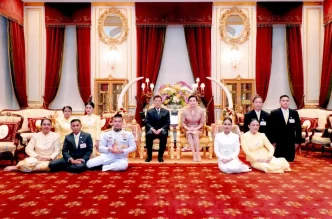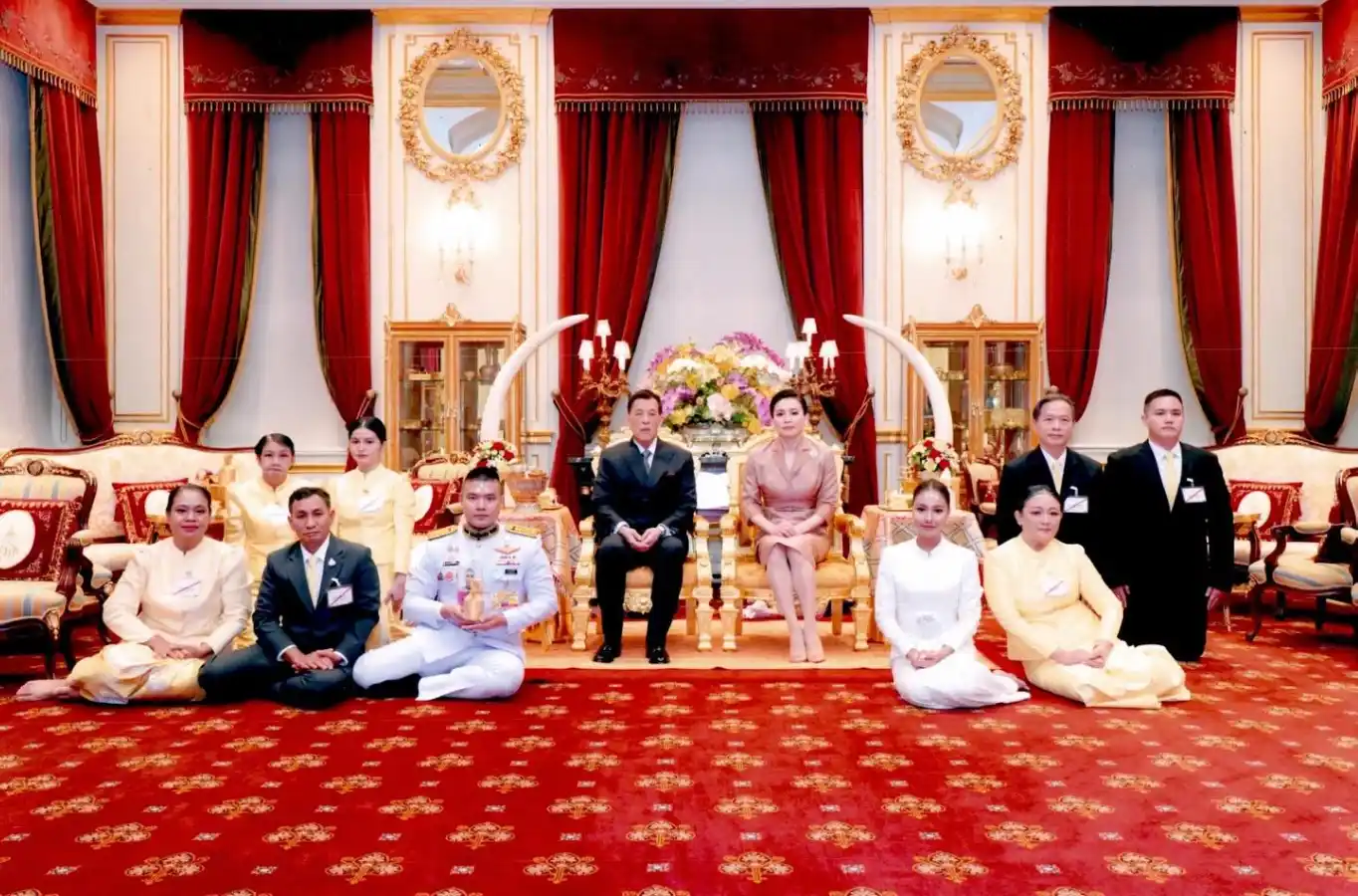In a groundbreaking moment for Thailand’s social landscape, His Majesty the King has granted the first-ever royally-sponsored wedding ceremony to a same-sex couple, marking a significant step forward for LGBTQIA+ rights in the kingdom. The wedding, held on May 29, 2025, in Bangkok, united Kampol, a royal household official under the Royal Guard Unit Headquarters, Unit 904, and Nutthabhum, in a ceremony steeped in tradition yet resonant with modern progress. This event, celebrated as Siam’s first official royally-sponsored wedding for members of the LGBTQIA+ community, has sparked widespread discussion about the evolving role of the monarchy in championing inclusivity.
A Ceremony of Tradition and Transformation
The wedding of Kampol and Nutthabhum was not only a personal milestone for the couple but also a historic occasion that intertwined centuries-old royal customs with contemporary societal shifts. Following the ceremony, Nutthabhum took to social media to express his gratitude, writing on his personal Facebook page: “My family and I deeply appreciate this unparalleled royal kindness, which is the highest honour for my family and lineage. Long live Their Majesties the King and Queen.” Earlier in the year, on February 1, 2025, Their Majesties presented the couple with a bouquet and gifts to commemorate their marriage registration, underscoring the royal endorsement of their union.
Royally-sponsored weddings in Thailand trace their origins to the reign of King Vajiravudh (Rama VI), with the first recorded event occurring on August 26, 1918, at Varopat Piman Throne Hall in Bang Pa-in Palace. That ceremony united King Prajadhipok (Rama VII), before his ascension, and Queen Rambhai Barni, establishing a tradition that blended cultural rituals such as the royal conch shell water blessing and anointment with formalities like signing the marriage register in the presence of the monarch. Over time, these ceremonies evolved to reflect legal requirements, incorporating official marriage registration under Thailand’s Civil and Commercial Code, while adapting protocols to suit both royalty and commoners.
The significance of extending this tradition to an LGBTQIA+ couple cannot be overstated. While Thailand has long been regarded as a relatively tolerant society in Southeast Asia for gender and sexual diversity, legal protections and societal acceptance have often lagged behind cultural openness. This royal gesture, therefore, serves as a powerful symbol of change, aligning the monarchy with progressive values at a time when marriage equality remains a contentious issue in many parts of the region.
The Monarchy’s Role in Social Progress
The Thai monarchy has historically played a central role in shaping national identity and cultural norms, often acting as a unifying force amid political and social upheavals. By sponsoring this wedding, His Majesty the King has signaled a willingness to engage with modern challenges, potentially redefining the institution’s relevance in a rapidly changing society. Analysts suggest that this move could encourage broader acceptance of LGBTQIA+ rights, particularly in a country where the royal family’s actions carry immense symbolic weight.
“This is a profound moment for Thailand,” said Dr. Siriwan Chaiyaporn, a sociologist specializing in gender studies at Chulalongkorn University. “The monarchy’s endorsement of a same-sex union through such a public and traditional ceremony sends a message that inclusivity is not just a modern ideal but can be woven into the fabric of our heritage.” While Dr. Chaiyaporn emphasized the positive impact, she also cautioned that systemic change, including legal reforms for marriage equality, must accompany symbolic gestures to ensure lasting progress.
Indeed, Thailand has made strides toward recognizing same-sex partnerships in recent years. In 2022, the government introduced a civil partnership bill that, while not granting full marriage rights, offered limited legal protections to same-sex couples. However, full marriage equality legislation has faced delays in parliament, with conservative factions citing concerns over traditional family structures. The royal sponsorship of Kampol and Nutthabhum’s wedding may add momentum to these legislative efforts, though it remains to be seen whether it will directly influence policy outcomes.
A Personal Triumph Amid Public Scrutiny
For Kampol and Nutthabhum, the wedding represents more than a public statement; it is a deeply personal victory. Kampol’s position within the Royal Guard Unit Headquarters highlights the intersection of duty and identity, as he serves in a role tied to the monarchy while breaking barriers as part of an LGBTQIA+ couple. The couple’s journey to this historic moment has not been without challenges, as societal attitudes toward same-sex relationships in Thailand, while generally more accepting than in neighboring countries, can still vary widely across urban and rural divides.
Public reactions to the wedding have been overwhelmingly positive, with social media platforms buzzing with messages of support. Many Thais have hailed the event as a proud moment for the nation, with comments on X reflecting admiration for the monarchy’s progressive stance. One user posted: “This shows Thailand at its best—honoring tradition while embracing love in all its forms.” However, some conservative voices have expressed reservations, arguing that such ceremonies should remain reserved for heterosexual unions to preserve cultural norms. These dissenting opinions, though a minority, underscore the broader societal debate that continues to unfold.
Regional and Global Implications
Thailand’s landmark wedding also holds significance beyond its borders. In Southeast Asia, where many countries still criminalize same-sex relationships or lack legal protections for LGBTQIA+ individuals, this event could inspire advocacy movements. Nations like Singapore, which recently decriminalized homosexuality but stopped short of recognizing same-sex unions, and the Philippines, where marriage equality remains a distant prospect, may look to Thailand as a model of incremental progress. Globally, the wedding adds to a growing narrative of cultural institutions adapting to modern values, challenging the notion that tradition and inclusivity are inherently at odds.
Yet, experts warn against overinterpreting the event as a panacea for regional challenges. “While this wedding is a powerful symbol, it does not erase the structural barriers faced by LGBTQIA+ communities across Southeast Asia,” noted Areewan Sombat, a human rights advocate based in Bangkok. “Legal recognition, anti-discrimination laws, and public education must follow to ensure that symbolic acts translate into tangible rights.” If confirmed, future royal endorsements of similar unions could further normalize acceptance, though such developments remain speculative at this stage.
Bridging Past and Future
The royally-sponsored wedding of Kampol and Nutthabhum encapsulates a unique moment in Thai history—one where the weight of tradition meets the urgency of social change. It harkens back to the ceremonies of past monarchs while pointing toward a future where love, in all its diversity, might find equal footing under the law and within cultural norms. For now, the event stands as a beacon of hope for many, even as it prompts critical questions about the pace of reform in Thailand and beyond.
As the nation reflects on this milestone, the voices of Kampol and Nutthabhum remind us of the human stories at the heart of such historic shifts. Their union, blessed by royal kindness, challenges Thailand to continue weaving inclusivity into its national tapestry, ensuring that progress is not just celebrated in ceremonies but enshrined in everyday life.
















